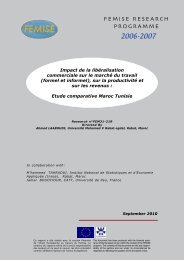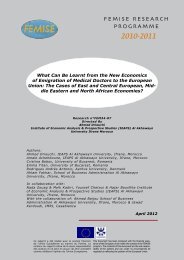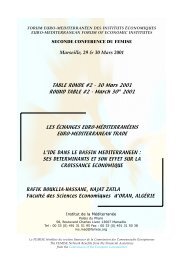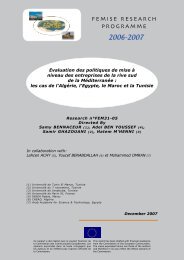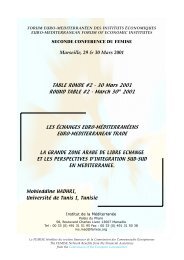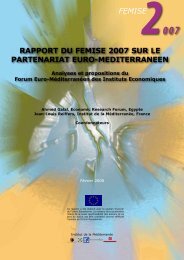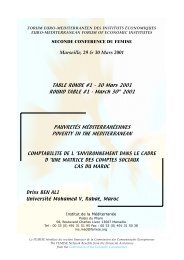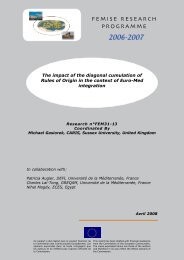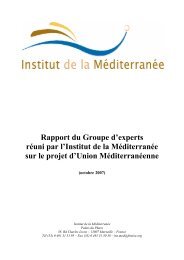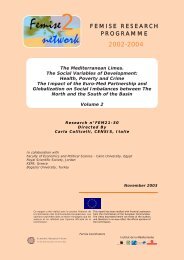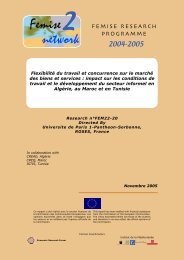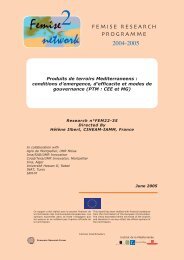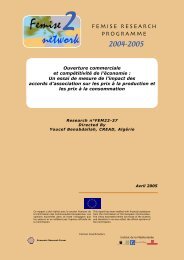PDF, GB, 139 p., 796 Ko - Femise
PDF, GB, 139 p., 796 Ko - Femise
PDF, GB, 139 p., 796 Ko - Femise
You also want an ePaper? Increase the reach of your titles
YUMPU automatically turns print PDFs into web optimized ePapers that Google loves.
In 1972 the European Commission launched the Global Mediterranean Policy (GMP)<br />
that was aimed at providing trade concessions to most MPCs. This policy resulted in a<br />
series of so-called Cooperation Agreements that were concluded between 1973 and<br />
1980 with most MPCs. In particular, these agreements extended earlier preferences for<br />
MPCs exports of agricultural products both in terms of coverage and the margins of<br />
preference. However, at the same time these exports were subject to protectionist<br />
measures imposed by the European Common Agricultural Policy (CAP).<br />
Following the southern enlargement the EU concluded a new series of agreements with<br />
the MPCs called Adaptation Agreements. As a result of this renovated policy by the end<br />
of 1993 all tariffs on exports from the MPCs were eliminated, however, non-tariff<br />
barriers (NTBs) to trade related to the CAP were still in force.<br />
The final round of trade liberalization between the EU and the MENA countries was<br />
initiated in 1995 at the Barcelona conference that set the ambitious goal of creating the<br />
Euro-Mediterranean Free Trade Area (EUROMED) by the target date of 2010. The<br />
creation of the EUROMED is to be achieved by means of the new generation of the<br />
Euro-Mediterranean Association Agreements between the EU and the MPCs<br />
accompanied by free trade agreements between the MPCs themselves. In contrast to<br />
earlier, mostly unilateral, trade liberalization (with exception of Cyprus, Turkey, Malta<br />
and Israel), the new Association Agreements provide for the implementation of bilateral<br />
free trade between the EU and the MPCs. The EUROMED foresees free trade in<br />
manufactured goods and progressive liberalization of trade in agricultural products.<br />
In addition to “vertical” bilateral trade liberalization with the EU the MPCs are<br />
committed to implement “horizontal” trade liberalization among themselves. However,<br />
compared to the Euro-Mediterranean Association Agreements, trade liberalization<br />
between particular MPCs is still far less advanced. Given the lack of significant<br />
progress in liberalizing trade at the regional and sub-regional levels in the MPCs region<br />
some countries located both in the Middle East and North Africa decided to liberalize<br />
their trade on bilateral basis. This led to the establishment of the grid of bilateral trade<br />
agreements by the end of the 1990s that prepared the ground for the Agadir Declaration<br />
signed in 2001 by the representatives of four MPCs: Egypt, Jordan, Morocco and<br />
Tunisia. The Agadir Declaration included a commitment to the establishment of a free<br />
9



